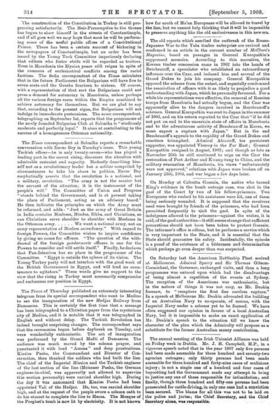. The Times correspondent at Salonika reports a remarkable conversation
with Enver Bey in Tuesday's issue. This young Turkish officer—he is only twenty-seven—who has played a leading part in the recent rising, discusses the situation with admirable restraint and sagacity. Modestly describing him- self not as a revolutionary leader but a soldier compelled by circumstances to take his share in politics, Enver Bey emphatically asserts that the revolution is a national, not a military, revolution. " The army is not the master but the servant of the situation; it is the instrument of the people's will." The Committee of Union and Progress "stands behind the Government, and is at present taking the place of Parliament, acting as an advisory board." He then indicates the principles on which the Army must be reformed, and adds : "Just as the army of Great Britain in India contains Moslems, Hindus, Sikhs, and Christians, so can Christians serve shoulder to shoulder with Moslems in the Ottoman army We want a national army, not an army representative of Moslem ascendency." With regard to foreign Powers, the Committee wishes to inspire confidence by giving no cause for offence. "The question of the with- drawal of the foreign gendarmerie officers is one for the Powers to consider and will settle itself." Finally, he declares that Pan-Islamism has no place in the programme of the Committee. "Egypt is outside the sphere of its vision. The Young Turkey party will not interfere with the good work of the British Government in Egypt, and will lend no coun- tenance to agitators." These words give no support to the view that the rising in Turkey must necessarily compromise and embarrass our position in Egypt.






































 Previous page
Previous page